Once again, this week’s Star Trek: Picard contains some incredibly strong elements — but ultimately, “Surrender” fails to maintain the raucous momentum achieved across the first six episodes of the season.
As a companion to “Dominion,” the episode feels a little padded and stretched, with a number of repetitive elements and an errant tone — especially in the long-anticipated scenes between Will Riker (Jonathan Frakes) and Deanna Troi (Marina Sirtis), finally together again after a season long build-up.
To summarize: along with those Riker and Troi scenes on the Shrike, we get more incredible work from Amanda Plummer as Vadic, who surprisingly meets her demise at the end of the episode. We get an amazing observation lounge reunion of the original Next Gen cast. We also get a wonderful rendition of Jack (Ed Speleers) and Deanna performing a little ditty to close out the episode and set up what’s to come next week.
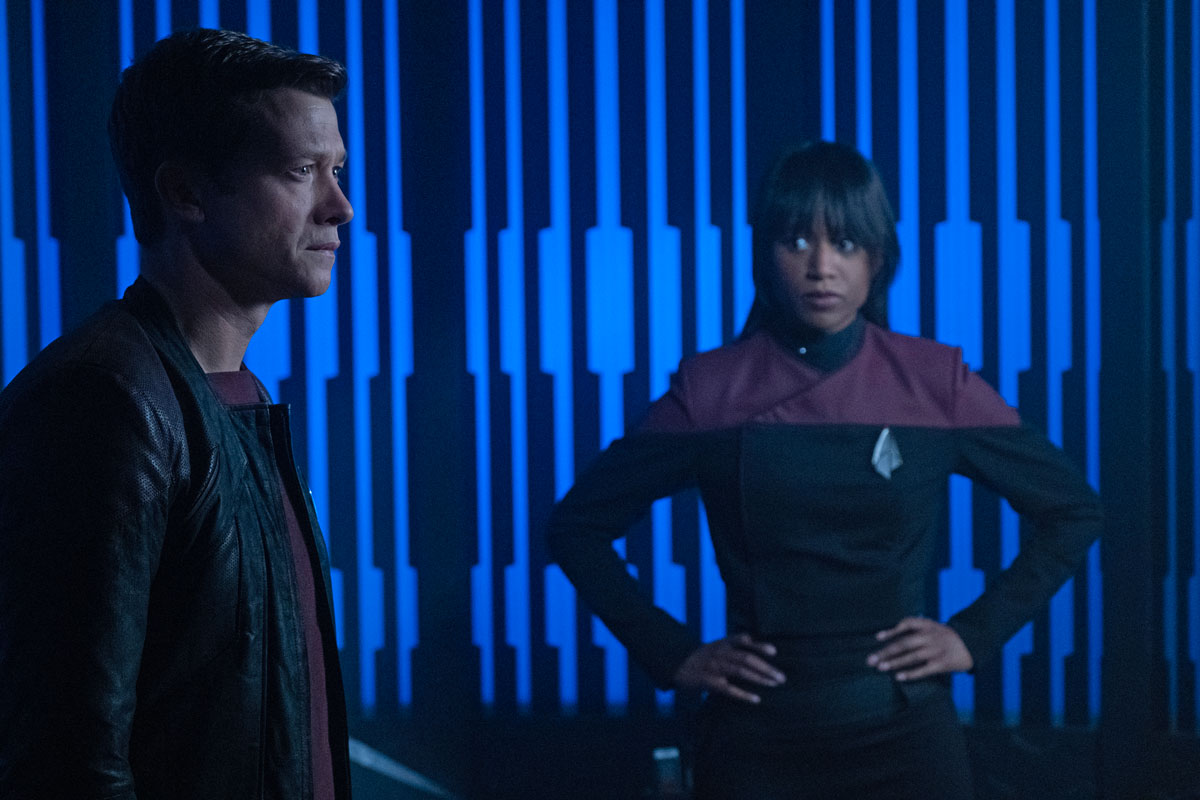
And, as the strength and core of the episode, we get some dynamic scenes of a new version of Data (Brent Spiner) coming to life via an internal battle of wits with Lore (also Spiner) in an effort to regain control of the bridge. The scene is filled with deep, wonderful emotion from the great actor, but as an example of how this episode is a little bit off the mark in tone and efficiency, it also feels familiar — and that’s because in the prior episode, Data vs. Lore I also takes place under the watchful eye of Geordi La Forge (LeVar Burton) as the android attempts to regain control of the ship’s internal forcefields.
Both scenes are great! Both scenes showcase the abilities of Spiner in exemplary ways! But both scenes also share the exact same story beats and occur in back-to-back episodes, which is a peculiar choice that feels oddly repetitive.
Having said that, and moving beyond the context of its presentation, Data vs. Lore II is beautifully written and structured. From what we’ve seen since meta-Data returned two episodes ago in “The Bounty,” we know there is a partition separating the personalities of Data and Lore inside this new android, and as plot would have it, our heroes are currently in need of “an asynchronous AI matrix capable of computational speeds beyond 90 trillion operations a second” in order to reclaim control of the bridge from Vadic.
So with that, Geordi brings the partition between the two brothers down, knowing they only have one shot at this new version of Data actually achieving the vision of creator Altan Soong, who had hoped that merging the memories of not only Data and Lore — with a little bit of B4 and Lal in there — would result in something that would “rise to be the best of us,” with a representation of the “wisdom and true human aesthetic of age.”
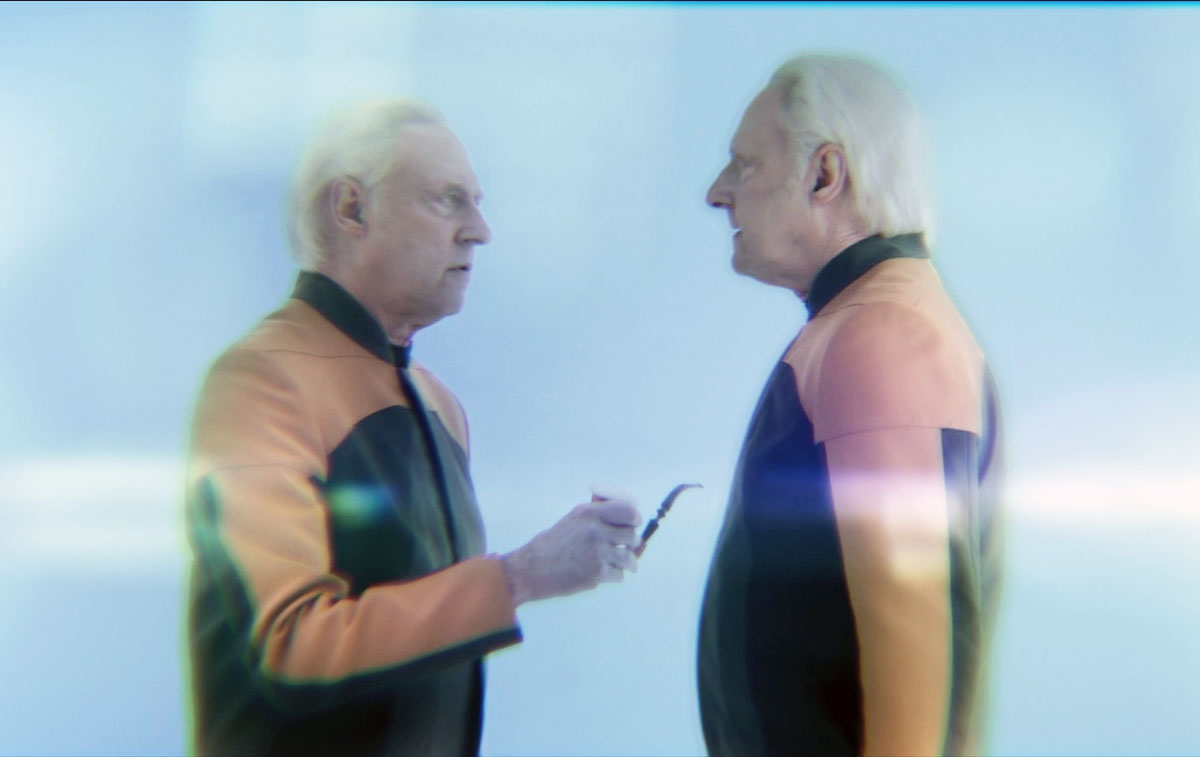
After a season of rotating between dark and murky scenes on the Titan, the Shrike and M’Talas Prime, the portrayal of this digital showdown between Data and Lore jumps off the screen with Spiner playing against himself in front of a stark white background.
Lore is confident he is going to win their battle, gloating about his “conquests” being “the only sensible measure of the success of a life” while mocking Data’s collection of “trinkets,” which appropriately include his Sherlock Holmes cap and pipe. It was Data, after all, who said way back in “Elementary, Dear Data,” that, “Holmes collected nothing, neither trinkets nor thoughts, which were not specifically significant to him.”
It’s a bit of a masterstroke that a single line of dialog from an episode of TNG that originally aired in 1988 could be used so impactfully here, but as the scene unwinds, it is, of course, those “specifically significant” trinkets and thoughts that allow him to finally thwart his misguided brother once and for all.
For Data, the trinkets are “the only sensible measure of the worth of a life,” and as he innocently discards them into the hands of Lore, who flitters them away into the digital stream, it becomes clear he is slowly imbuing himself into Lore. “These belong to you now,” says Data of the memories that define him. “I am how I am because they exist.”
A hologram of Tasha Yar, his trusty tricorder, his deck of cards, and then, most impactfully, his beloved cat, Spot. “This simple creature managed something quite miraculous… He taught me to love. He is the best of me. The last of me.”
From outside their confrontation, Data’s friends are watching his positronic matrix being overwhelmed by Lore, which turns out to be exactly the point. As Geordi painfully acknowledges that their friend is gone, Lore’s red matrix is suddenly replaced by Data’s beautiful blue representation as the android narrates his victory. “You took the things that were me, and in doing so, you have become me,” he says. “We are one now. We are me. Goodbye, brother.”
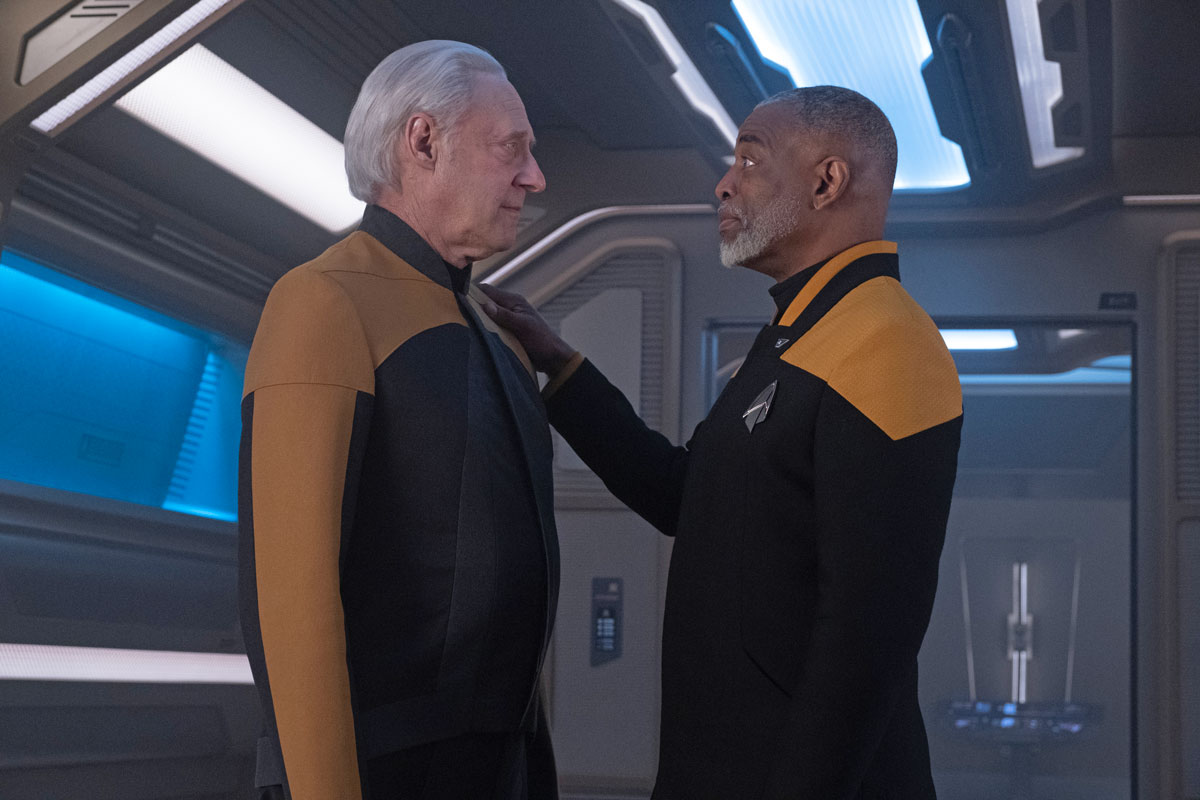
The victory for Data is an extremely satisfying one, and the visualization of the blue and red positronic matrix, combined with the exchange of memories in the white room, was a wonderful and emotional way to portray Data’s psyche being reborn as something entirely new. A new version of an old friend.
“I hope in me, you will see the friend you once knew. For better or worse, I am changed. Clearly older,” he says, as he painfully cracks his neck. The scene in which Data and La Forge reconnect briefly powerfully conveys the sentiment that the one forever constant for the android has been his gratitude for Geordi’s friendship.
And because the death of ‘virtual’ Data at the end of “Et in Arcadia Ego, Part 2” was such a meaningful and impactful moment in the series, the writers do a good job of explicitly highlighting a discussion with Picard about his previous desire to experience death. “I know that ‘me’ is resting peacefully,” Data tells a hesitant Picard, “But this me would rather be no place else in the universe.”
Seeing Spiner portray Data with a knowing ease and almost sprightly attitude feels like the perfect amalgamation of a character who has been learning about humanity his entire life, and now has finally achieved it.
This new version of Data flashes the chops of his updated personality almost immediately when he announces to the ship, “Greetings, USS Titan, this is your friendly positronic, pissed off security system back online.” It’s a great line and leads to the surprising (and perhaps disappointing) end for Vadic, a fantastic franchise villain through eight episodes of this season.
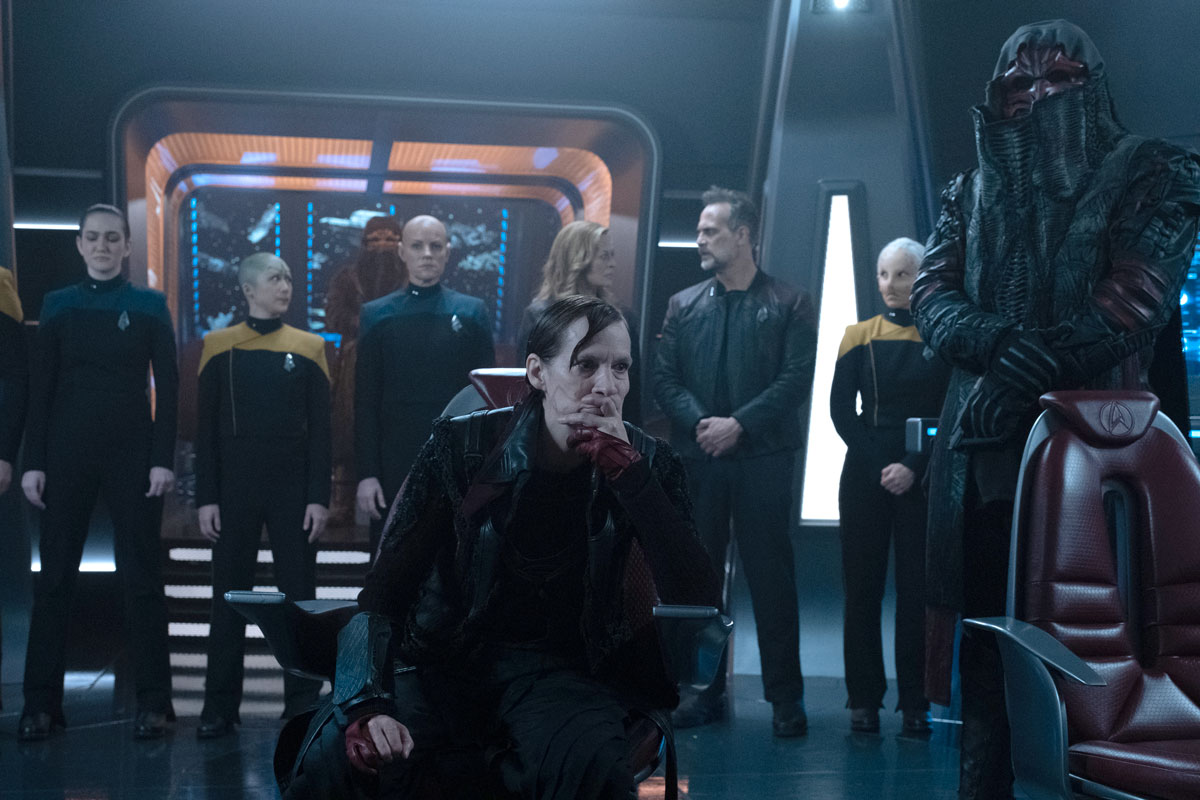
While Data was battling himself for his internal supremacy, Vadic had taken control of the Titan from the bridge, which she laid claim to at the end of last week’s outing. Plummer, of course, is fantastic in her swan song as the character, imparting real menace and terror into the captive bridge crew, who she uses as bait to eventually get Jack Crusher to show himself to her.
Sadly, and some might say unnecessarily, we see the gruesome execution of Lt. T’Veen (Stephanie Czajkowski) as part of the bridge takeover. Czajkowski has been impressive all season long as the Vulcan science officer on the Titan bridge. Her loss definitely hits hard — and might have added to the dramatic stakes a little bit more if Vadic had survived the episode.
Once Data is in charge, the hustler that is Jack Crusher plays his final cards from the bridge of the Titan, activating a portable forcefield to protect himself and Seven as the evacuation hatch on the bridge (that’s new!) opens up to space and Vadic and her Changelings are sucked into the void. But not before Vadic gets out one beautiful final parting quip, “Fucking solids.” She’s a legend.
One thing the death of Vadic accomplishes well is to reset the importance of the mystery of exactly who has been calling the shots for the Changelings. As we approach the final two episodes of the series, it is a compelling riddle. Lots of theories abound, and there have likely been some clues teased by Terry Matalas and his writer’s room across the past eight episodes, but the identity of the enigmatic, disembodied head remains a delicious mystery.
Following Vadic’s death, we get an emotional reunion that has been more than 20 years in the making, with all seven original Next Gen cast members — Picard, Riker, Data, La Forge, Worf, Crusher, and Troi — congregating again for a good old fashion planning session in the observation lounge. The scene packs an emotional punch, especially coming off the realization that Data is really and truly back.
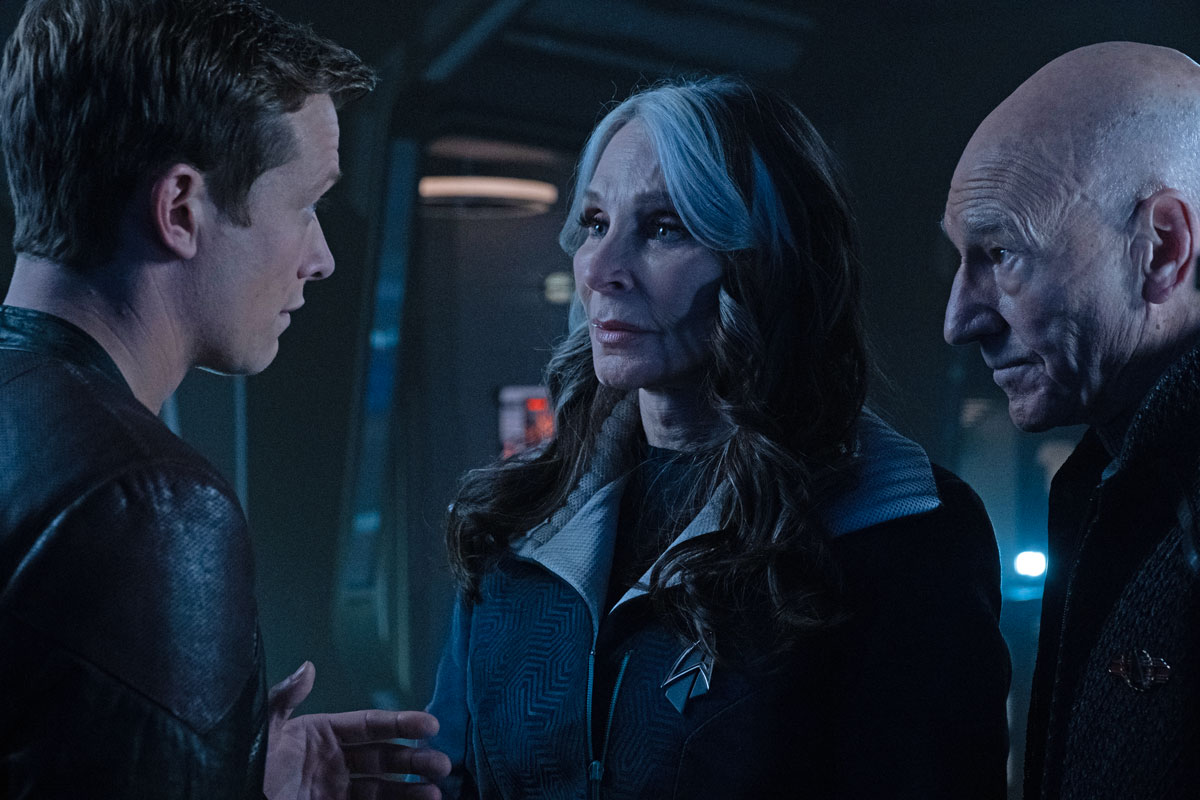
The scene includes a heartfelt acknowledgement to her friends from Beverly (Gates McFadden) for having shut them all out of her life, as well as a nice Worf (Michael Dorn) one-liner, and ultimately concludes with a log entry voiceover from Jean-Luc Picard himself (Patrick Stewart) setting the table for what’s to come. And what’s to come begins with Deanna meeting Jack in a one-on-one therapy session after she tells everyone at the table that she can readily feel a “darkness” surrounding him.
Jack has been central to what’s been happening throughout the episode, revealing to his parents his strange ability to jump into the minds of other people and control their actions. Vadic was aware of this “gift,” affirming it’s one of the reasons they’ve been after him. Vadic also told him just before her death that she could help piece together and explain the voices in his head, and even tell him what’s beyond the red door in his visions.
But with Vadic gone, the exploration of that mystery is now down to Jack and Deanna, two empathic kids doin’ the best they can. Oh, yeah, life goes on, “we’ll go together, you’re not alone.” (Apologies to John Cougar Mellencamp.) And with that, we are poised to explore Jack’s visions and to make a deal to find out exactly what’s behind the red door.
This moment with Troi is what many fans have been waiting for. It’s Sirtis at her best, leading and helping those around her to discover hidden truths within themselves, and it looks like she will be playing a pivotal role as the season winds to a close. Welcome news, for sure.
However, the less said about the scenes between Riker and Troi being held against their will on the Shrike, the better. Like the Changelings themselves, the scenes were oddly misshapen and contained a weird tone that betrayed the overall mood of the episode.
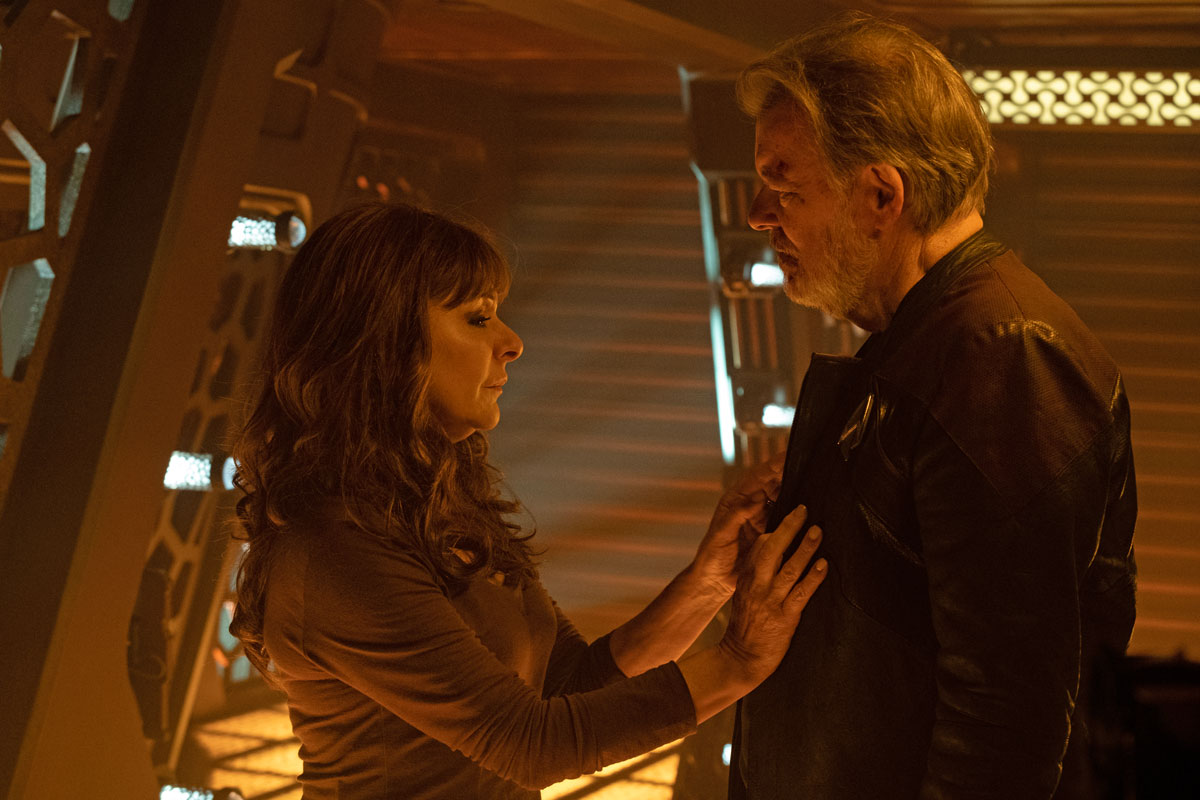
The discussion between Will and Deanna should be remembered for the heartfelt reunion between the longtime couple as they explored the depths of their personal disconnect following the loss of their son, Thaddeus. As part of that deep dive, Deanna emotionally admits that, like Jack, she has also been guilty of engaging in some mind control abilities, in her case attempting to erase Riker’s grief over the loss of his son without his consent.
This revelation is a shocking one to hear, but it is understandable. Deanna is a Betazoid, struggling to cope with the weight of the grief consuming her – not just her own, but from that of everyone she encounters. It’s a horrific violation of Riker, but an interesting path for the character of Troi.
What doesn’t work about this scene, however, is Deanna’s almost aggressive defense of her betrayal. Instead of showing legitimate contrition or shame for such an awful manipulation of her spouse, Deanna tries to rationalize it by saying she wasn’t trying to erase Will’s grief but was trying to help him carry it. How about just saying you’re sorry?
This choice for the character doesn’t feel authentic to Deanna Troi in any way, regardless of the obvious amount of pain she has endured as a Betazoid in coping with her son’s death. The lesson learned that “you can’t skip to the end of healing” is a pretty trite summation of her refusal to fully embrace her behavior and how it affected Riker.
As if that exchange wasn’t enough, what comes next is even worse. In a misguided effort to maybe lighten the mood of the episode, the couple are suddenly seen joking about their mutual disdain for Nepenthe — their rural adopted home seen in the Season 1 episode of the same name — and how suddenly neither of them like the planet’s aesthetic.
(Keep in mind, this goofy moment is coming directly on the heels of T’Veen’s execution and the reveal that Troi violated Riker’s grief. Such a weird, erratic tone. And I’m not even going to get into the cringey three-way comedy routine that breaks out once Worf shows up to rescue them. Bizarre!)
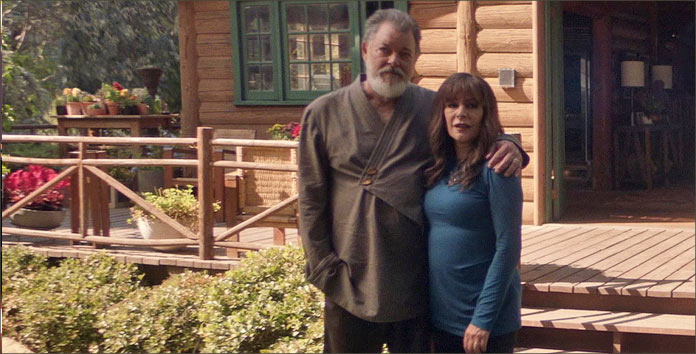
Anyway, the attack on “Nepenthe” needs to be called out for what it is: the current showrunner and writing team’s thinly-veiled tolerance of Picard’s first two seasons. Obviously, Season 1 and 2 each received a mixed reception for being something very different from TNG, but here the script is taking direct aim at series co-creator Michael Chabon, a long-haired, bearded, Berkeley-residing novelist of some acclaim. (“It’s like it was designed by a cabal of retro prairie hipsters.”)
It’s uncouth. It’s uncool. And honestly, it’s a little pathetic. If you want to take a shot at Picard Season 1, maybe taking aim at a universally beloved episode co-written by Chabon himself is not the best way to do it. “Nepenthe” is a brilliant hour of television that deconstructs the language of Star Trek in legitimately interesting ways, and for some reason this production decided to belittle the artists that created it. Unreal.
If anyone from the production team is reading this and wants to deny the above is what happened, then you can instead apologize for not having a better read on exactly how a line like that would be perceived in the context in which it was presented. Bad form all the way around.
MOMENTS OF STASHWICK
We think Todd Stashwick and his portrayal of USS Titan captain Liam Shaw is destined for Trek icon status — each week this season, we’ll be highlighting one one of the character’s (and actor’s) best moments.
As it was last week, Captain Shaw doesn’t have a lot of scenes in “Surrender,” which makes the choice this week simple.
Shaw admonishes Seven for failing to follow his command to sacrifice himself and blow the turbolift, which would have ended the standoff with Vadic. “You are a Starfleet officer. You don’t have the luxury to only make choices that feel hunky-dory. Everything has consequences.”
In this case, that consequence is the death of T’Veen, another trauma that Shaw will have to live with, knowing that he would have traded places with her in a heartbeat… which is exactly what he tried to do.
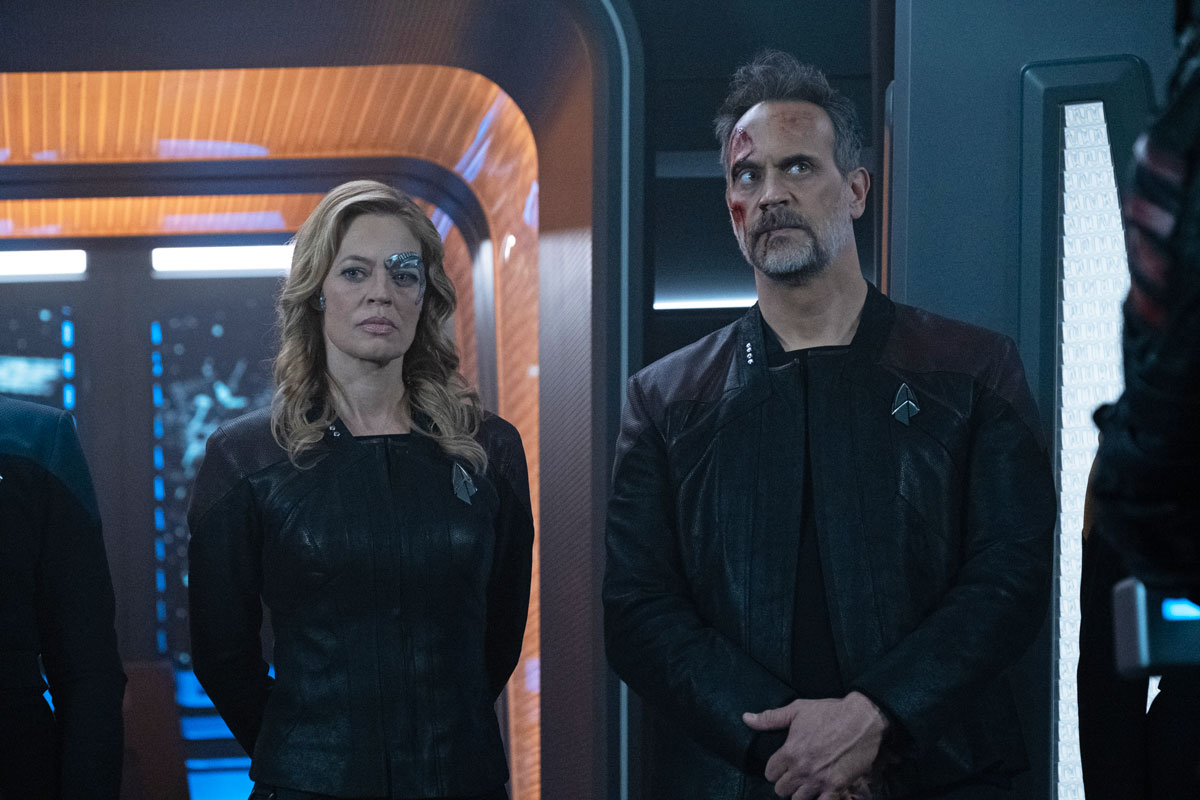
OBSERVATION LOUNGE
- The opening of the episode also excels with Vadic conducting a symphony with her hand movements as she takes away the crews’ eyes, ears and “the very road ahead of them” by eliminating their sensors and their comms — and then locking down their ability to move inside the ship. Great stuff.
- The Shrike is no more. After seeing Vadic’s frozen body shatter into a million pieces against the ship’s hull, the Titan takes aim on the powerful ship with Captain Shaw giving the honors to his second-in-command, Seven, to fire the volleys that destroy it.
- Although the execution of T’Veen is difficult to watch, the tension built up in the scene that also features Lt. Mura (Joseph Lee) and Ensign Esmar (Jin Maley) in jeopardy, is extremely well done.
- As part of Raffi (Michelle Hurd) and Worf’s return to the Titan, we get a standout moment for the badass warrior — Raffi, not Worf — as she takes down a squadron of Changelings in a corridor sword-fight scene worthy of Star Trek’s legendary other Michelle.
- Yintaru means “baby of immense size” in the Betazoid language. Yep.
- Troi laments the lack of raktajino lattes on Nepenthe, made from the Klingon coffee often mentioned on Star Trek: Deep Space Nine.
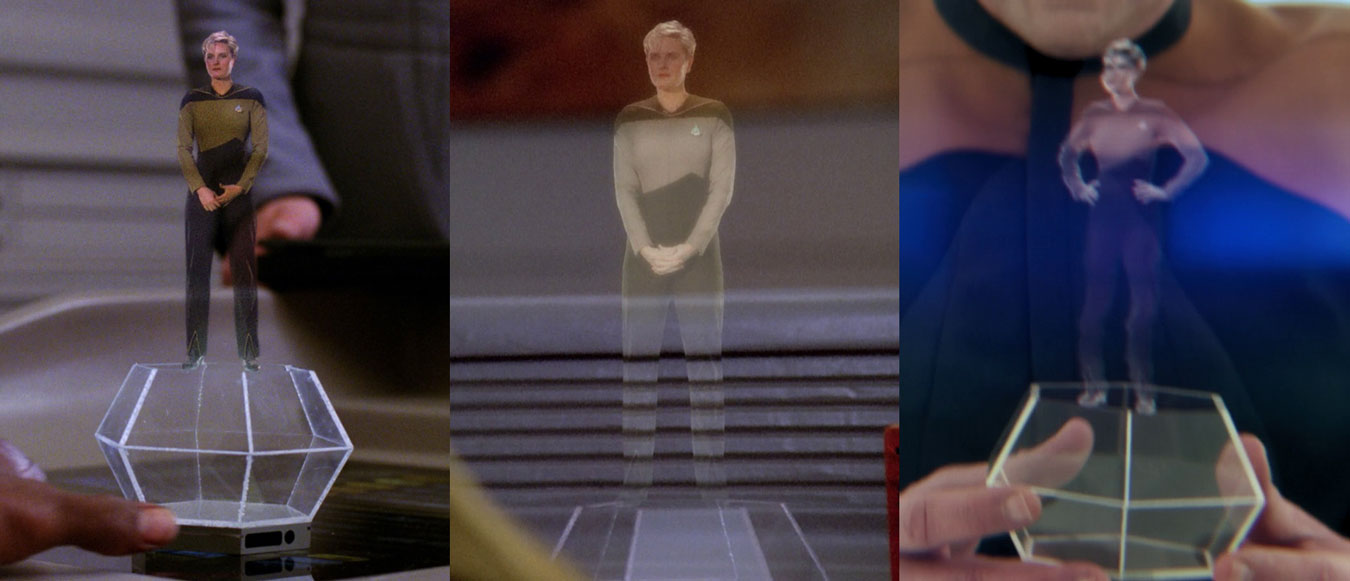
- The brief appearance of Data’s Tasha Yar memorial hologram — seen previously in “The Measure of a Man” and “The Most Toys” — is the first appearance of Denise Crosby in a Star Trek production since 1994’s “All Good Things…”
- Despite having kittens in “Genesis,” Data’s cat Spot (last seen in Star Trek: Nemesis) is again portrayed by a male cat. No further explanation is required.
- The Titan engaging their cloak from the HMS Bounty before the end of the episode is just cool.
- Marina Sirtis makes her first substantial appearance of the season this week; while some fans voiced complaints that the show should have included Troi in a more comprehensive way earlier, both showrunner Terry Matalas and Picard co-star Jeri Ryan pushed back, noting Sirtis’ required travel from London for filming and a desired smaller role.
- Michael Dorn makes his 279th appearance in an episode of Star Trek as Worf, extending his record tally for the franchise.
- “Surrender” is the second episode this season helmed by director Deborah Kampmeier, and the episode was written by Matt Okumura (who previously wrote “Hide and Seek” in Season 2.)

While many pieces of “Surrender” work — including those involving Vadic’s histrionics, Data’s emergence, and that great observation lounge reunion — the episode as a whole feels stretched and repetitive from what we saw in “Dominion”
But it’s almost time for the long-awaited Frontier Day celebration, so we are more than ready to see what the creators of this overall great season have in store for us next week, as we near the finish line.
Jim Moorhouse is the creator of TrekRanks.com and the TrekRanks Podcast.
He can be found living and breathing Trek every day on Twitter as @EnterpriseExtra.
![]()
Star Trek: Picard Season 3 will continue on April 13 on Paramount+ in the United States and on CTV Sci Fi Channel and Crave in Canada — following the next day in the UK, Australia, Italy, France, Germany, Austria and Switzerland. The series is also available on Amazon’s Prime Video service in most other international locations.
